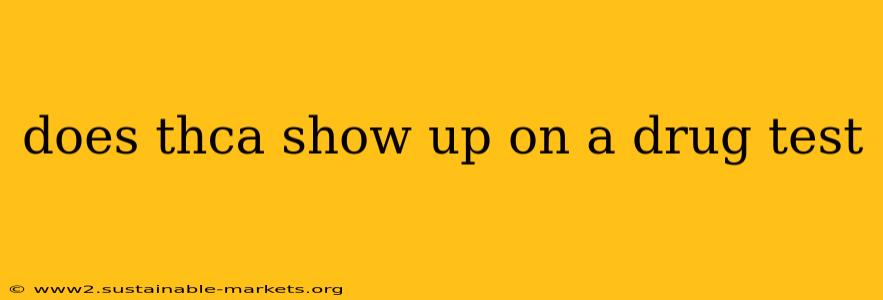Does THCA Show Up on a Drug Test? Understanding THCA and Drug Testing
The question of whether THCA shows up on a drug test is a complex one, and the short answer is: generally, no, THCA itself does not show up on standard drug tests. However, there are important nuances to understand.
This article will delve into the specifics of THCA, its relationship to THC, and how this impacts drug testing procedures. We'll explore the science behind detection, the limitations of current testing methods, and what you need to know to avoid any misunderstandings.
What is THCA?
THCA, or tetrahydrocannabinolic acid, is a non-psychoactive precursor to THC (delta-9-tetrahydrocannabinol), the main psychoactive compound in cannabis. THCA is found abundantly in raw, unheated cannabis plants. It's only when THCA is heated (a process called decarboxylation) that it converts to THC, the compound that produces the "high" associated with marijuana use.
How Drug Tests Work
Standard drug tests, primarily used for workplace or legal purposes, are designed to detect THC metabolites – the byproducts created by the body as it processes THC. These metabolites can remain in the system for days, weeks, or even longer depending on factors such as frequency of use, metabolism, and body fat percentage.
Because THCA doesn't produce these same metabolites, it's not directly detected in typical drug screenings. The tests look for the presence of THC, not its precursor THCA.
The Catch: Conversion to THC
While THCA itself isn't detected, consuming large amounts of raw THCA-rich products could potentially lead to enough conversion to THC within the body to result in a positive drug test. However, this is highly unlikely with typical consumption levels of raw cannabis products. The amount of THCA needed to produce a detectable level of THC metabolites would be significantly higher than what is typically consumed.
Factors Influencing Detection
Several factors can influence the likelihood of a positive drug test, even with THCA consumption:
- Method of Consumption: Eating raw cannabis containing high levels of THCA is far less likely to lead to a positive drug test than smoking or vaping cannabis, which delivers already-decarboxylated THC directly into the bloodstream.
- Individual Metabolism: Metabolic rates vary between individuals, influencing how quickly the body processes and eliminates THC metabolites.
- Frequency of Consumption: Regular cannabis use, even if it involves THCA-rich products, significantly increases the chance of a positive drug test due to the accumulation of THC metabolites in the body.
- Test Sensitivity: The sensitivity of the drug test itself plays a crucial role. More sensitive tests can detect lower levels of THC metabolites.
Conclusion: Low Probability, But Not Impossible
In conclusion, while THCA itself doesn't show up on standard drug tests, it's crucial to remember that consuming extremely high quantities of raw THCA-rich products could theoretically lead to enough THC conversion to trigger a positive result. This remains highly improbable under normal circumstances.
The focus for individuals concerned about drug tests should remain on avoiding the consumption of products containing already-decarboxylated THC. For those seeking accurate information about cannabis and its effects, consulting with healthcare professionals or reliable scientific resources is always recommended. This information is for educational purposes only and does not constitute medical or legal advice.

